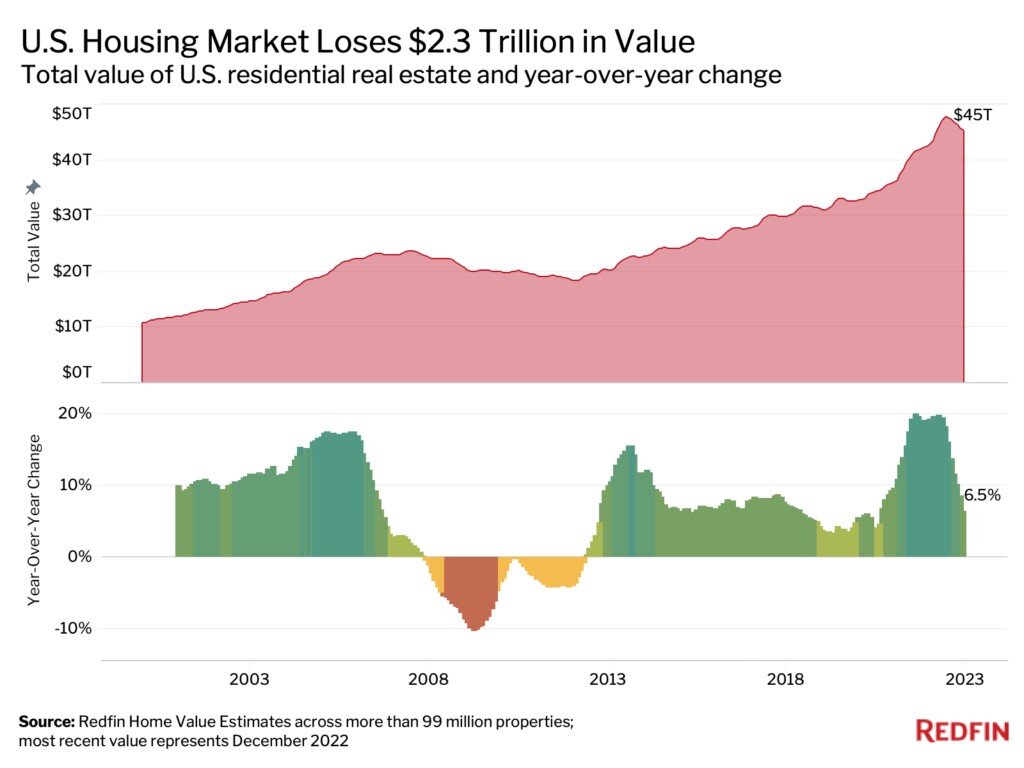Residential Real Estate News

U.S. Homeowners Lost $2.3 Trillion In Value Since Mid-2022
Residential News » San Francisco Edition | By Michael Gerrity | February 27, 2023 8:41 AM ET
According to national property broker Redfin, total value of U.S. homes was $45.3 trillion at the end of 2022, down 4.9% ($2.3 trillion) from a record high of $47.7 trillion in June 2022.
That's the largest June-to-December drop in percentage terms since 2008. While the total value of U.S. homes was up 6.5% from a year earlier in December, that's the smallest year-over-year increase during any month since August 2020. This is according to Redfin's analysis of more than 99 million U.S. residential properties.
The housing market has been shedding value because homebuyer demand has waned, which has also caused home prices to fall from their peak. The median U.S. home sale price was $383,249 in January, down 11.5% from a peak of $433,133 in May, and up just 1.5% from January 2022.
Homebuyer demand slowed in large part because rising mortgage rates--a consequence of the Federal Reserve's effort to curb inflation--made purchasing a home more expensive. The average 30-year fixed mortgage rate was 6.36% in December. While that's down from the 20-year high of 7.08% in November, it's roughly double the level from the start of 2022. Rates fell at the beginning of February, giving buyers some hope, but have since crept back up to December levels.
"The housing market has shed some of its value, but most homeowners will still reap big rewards from the pandemic housing boom," said Redfin Economics Research Lead Chen Zhao. "The total value of U.S. homes remains roughly $13 trillion higher than it was in February 2020, the month before the coronavirus was declared a pandemic."
Zhao continued: "Unfortunately, a lot of people were left behind. Many Americans couldn't afford to buy homes even when mortgage rates hit rock bottom in 2021, which means they missed out on a significant wealth building opportunity."
We primarily use year-over-year comparisons rather than comparisons to the peak for the metro-level and demographic breakdowns in the remainder of this report, as different metros and groups saw home values peak at different times.
The Bay Area's Housing Market Has Taken the Biggest Hit
The total value of San Francisco homes fell 6.7% year over year to $517.5 billion in December (a $37.3 billion decline)--a larger drop in percentage terms than any other major U.S. metropolitan area. Next came two other Bay Area markets: Oakland (-4.5%) and San Jose (-3.2%). Only three other metros saw year-over-year declines: New York (-1%), Seattle (-0.4%) and Boise, ID (-0.3%). This analysis includes the 100 most populous metro areas, with the exception of Albuquerque, NM, which had insufficient data.
Pricey coastal tech hubs have experienced outsized declines in home values for a few reasons:
- They are among the most expensive markets in the country, which means home values have more room to fall.
- They have seen an exodus of residents during the pandemic because people prioritized space and affordability over proximity to the workplace.
- They were hit hard by tech layoffs and are home to many residents with significant investments in the stock market, which just had its worst year since 2008.
The good news for Bay Area buyers is that home prices are down and competition remains far lower than it was during the pandemic homebuying boom. San Francisco's median home sale price dropped 9.4% year over year to $1.3 million in January--the second biggest decline in the country. The good news for sellers is that the steep decline in prices has lured some buyers back.
"Three of my listings recently went under contract after sitting on the market for more than a month," said Ali Mafi, a Redfin real estate agent in San Francisco. "They all had a few showings here and there in the fall, but no buyer wanted to pull the trigger. And then suddenly in the new year, we had 10 or 15 people touring each property."
Florida's Housing Market Is Holding Value Relatively Well
The total value of homes in Miami rose 19.7% year over year ($77 billion) to $468.5 billion in December--the largest annual increase in percentage terms among the metros Redfin analyzed. Miami's housing market had roughly the same value in December as it did when it peaked in July at $472 billion.
Next came North Port-Sarasota, FL (+17.8%), Knoxville, TN (+17.7%), Charleston, SC (+17.4%) and Lakeland, FL (+16.9%). Florida was home to six of the 10 metros with the largest annual home-value gains, in percentage terms--even after Hurricane Ian caused billions of dollars in damage and displaced thousands of Floridians in fall 2022.
"Florida's housing market is being sustained by folks moving in from the North and as of recently, the West Coast," said Elena Fleck, a Redfin real estate agent in Palm Beach, FL. "People are pouring in from New Jersey and New York, in large part because Florida has relatively affordable homes and no income tax. They can get a lot more bang for their buck here."
Sign Up Free | The WPJ Weekly Newsletter
Relevant real estate news.
Actionable market intelligence.
Right to your inbox every week.
Real Estate Listings Showcase
Related News Stories
Residential Real Estate Headlines
- Las Vegas Area Home Prices Uptick 4.3 Percent Annually in March
- Single-Family Rent Growth in U.S. Trends Upward in 2025
- U.S. Mortgage Rates Tick Down Post Trump Tariffs Commencement
- President Trump's 'Liberation Day' Tariffs Potential Impact on the U.S. Housing and Mortgage Markets
- Baby Boomers Biggest Cohort of U.S. Home Buyers in 2025 as Millennials Decline
- U.S. Monthly Housing Payments Hit Record High in 2025
- U.S. Pending Home Sales Uptick in February
- Global Prime Residential Rent Slowdown Continued in Late 2024
- Ireland Home Price Inflation Hits 8 Year High in Early 2025
- Existing Home Sales in America Uptick in February
- Great Miami Area Residential Sales Decline 15 Percent Annually in February
- Mortgage Rates Uptick in Mid-March, Ending 9-Week Decline in U.S.
- World Property Ventures Builds the Future of Real Estate with New Funding Round
- U.S. Builder Sentiment Declines Amid Economic Uncertainty and Rising Costs
- Black Homeownership Rates in U.S. Enjoy Largest Annual Increase of All Racial Groups
- Wealthy Renters Are Taking Over More of the U.S. Rental Market
- If U.S. Congress Does Not Extend NFIP Soon, Thousands of Daily Home Closings Impacted
- U.S. Mortgage Applications Spike 11 Percent in Early March
- Greater Palm Beach Area Residential Sales Rise in Early 2025
- New Apartments in U.S. Are Leasing at Slowest Pace on Record
- U.S. Mortgage Rates Drop to 4 Month Low in March
- Overall U.S. Mortgage Delinquency Rates Dip in December
- New Tariffs on Canada, Mexico to Impact U.S. Homebuilder Input Costs
- Monaco's Property Market: A Tale of Two Cities
- U.S. Home Purchase Cancellations Surge, 1 in 7 Sales Getting Canceled
- U.S. Pending Home Sales Hit Historic Low in Early 2025
- Greater Miami Area Residential Sales Dip in January
- Governor DeSantis Supports Ending Property Taxes in Florida
- WPV Aims to Become the Berkshire Hathaway of Real Estate Tech
- U.S. Home Sales Slump Continues in January
- Average Americans Spend 38 Percent of Monthly Income on Mortgage Payments
- Switzerland's Safe-Haven Appeal Grows with World's Wealthy Homebuyers
- U.S. Builder Confidence Rapidly Declines in February
- Las Vegas Home Sales Rise 6.7 Percent Annually in January, Condo Sales Dip
- Homebuyer Demand in America Drops to 5-Year Low in Early 2025
- Ownership More Affordable Than Renting in Most U.S. Markets
- The World's First Global Listings Service Launches, Called a GLS
- Home Prices Continue to Rise in 89 Percent of U.S. Metros in Late 2024
- Global Luxury Residential Prices Showed Gradual Improvement in Late 2024
- U.S. Construction Hiring Rate Drops to Lowest Levels in 5 Years






